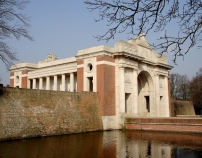| First Name: | Charles S | Last Name: | BETHELL | |
|---|---|---|---|---|
| Date of Death: | 29/10/1914 | Lived/Born In: | Tottenham | |
| Rank: | Private | Unit: | Gordon Highlanders2 | |
| Memorial Site: | Menin Gate, Ypres | |||
Current Information:Age-29 57, Stanley Road, South Tottenham
First Battle of Ypres Between 21st October and 22nd November, 1914 a desperate fight took place around the Belgium city of Ypres, the first of three major battles that were to be fought there during the course of the war. British troops entered Ypres in October. The 1st and 2nd Divisions plus the 3rd Cavalry Division had made their way up from the Aisne as part of the “Race to the Sea”, whilst the 7th Division came west to Ypres after Antwerp had fallen. The Germans knew that Ypres was the gateway to the Channel ports and that these were vital to Britain’s war effort so they poured reinforcements into the area. The fighting fell into three distinct battles; the Battle of Langemarck, 21-24 October, the Battle of Gheluvelt, 29-31 October and the Battle of Nonne Bosschen, 11 November. Ypres did not fall to the Germans but its defence during these two months resulted in the destruction of much of the old regular British Army. By 26th October the British troops in the Ypres salient were near breaking point and there were instances of them abandoning their trenches after putting up only a token resistance. 20th Brigade of 7th Division were in the line at Kruiseecke at the point of the salient where there was simply a 300 yard street running north-south on the top of the rise of ground with a few outlying houses on the eastern side. The British line was entirely on the forward slopes and therefore exposed and after a night of bombardment they were subjected to an infantry attack in the morning. The trenches of the two companies of 2nd Scots Guards holding the apex were completely destroyed and many men were buried alive. Some were dug out, others died. Later the same fate befell the 1st Grenadier Guards, 1st South Staffordshire and 2nd Border battalions and at 9 am German troops began to emerge from the woods in which they had concentrated overnight. The 2nd Gordon Highlanders had been in reserve trenches while all this was going and they had escaped the worst of the fighting. On the following day, the battalion returned to billets and rest until the afternoon of 28th October when, along with 1st Grenadiers they were sent to hold the cross roads at Gheluvelt as it was felt that an enemy attack was imminent. At 5.30 am on 29th October and concealed by fog, the expected Germans attack began. It fell on the Gheluvelt cross roads, where the Menin Road crossed between Kruiseecke and Poezelhoek. 7th Division were dug in south of the Menin road where 1st Grenadier Guards, and 2nd Gordon Highlanders, both of 20th Brigade, 7th Division were holding the line. What remained of 2nd Scots Guards and 2nd Borders were in support. At 7.30 am there was a very heavy bombardment of 1st Grenadier Guards followed by a dense infantry attack. Desperate close quarter fighting followed. Some Germans broke through and 1st Grenadier Guards were gradually forced back. Even then the survivors, supported by some of 2nd Gordon Highlanders made two counter attacks but overwhelming German numbers eventually forced them to retire to a ditch south of the Menin road, east of Gheluvelt where they joined some of the 1st Gloucestershire battalion. Here the German advance was checked but the cost had been high with nearly 500 casualties among the brigade. One of these was Charles Bethell of 2nd Gordon Highlanders. |
||||
| « Back to Search Results | ||||
| If you think any of the information shown here is incorrect, Click Here to submit your amends and comments | ||||




